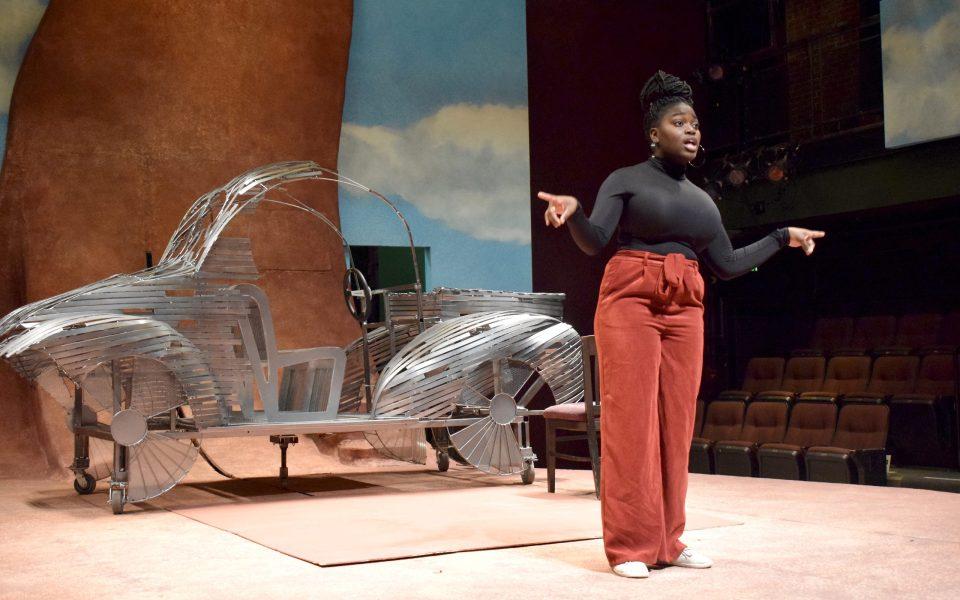Against a cheerful blue sky, stray clouds hung above the metalloid frame of a ’39 Ford that sat stationary on a winding, red-dirt road. The scene felt like Alabama, but the stories spoken on Feb. 2 rang out from the soul of 20th Century Pittsburgh.
Eight high schoolers from across the Triad converged at Triad Stage to participate in the third annual August Wilson Monologue Competition, where the nonprofit theater company is currently showing White Lightning. The students trained in a series of free workshops in libraries in Greensboro, High Point and Winston-Salem — taught by local artists Hilda Willis and Cassandra Williams — for months before facing off in semifinals to earn their places in last weekend’s statewide competition.
August Wilson, who died in 2005, was a venerated American playwright who came of age in Pittsburgh’s Hill District during the Jim Crow era. He was the son of a black woman from North Carolina and a Sudeten German immigrant father who, respectively, cleaned homes and baked pastries for a living. Wilson is best known for The Pittsburgh Cycle (also known as the Century Cycle), a series of 10 full-length plays set in different decades of the 20th Century for which he won two Pulitzer Prizes for drama. Triad Stage’s next production will be Wilson’s Two Trains Running, set in the 1960s.
“We had this one exercise where we were all in a circle throwing lines from our monologues out there and everything just flowed together; his words are just so juicy,” Second Place winner Aisha Sougou said. “Getting to know who he is and where he grew up and what characters in his life inspired characters in his plays… it’s beautiful.”
Sougou, a senior at UNC School of the Arts High School in Winston-Salem, will travel to New York City alongside First Place winner Halee Myers, a junior at Greensboro’s Weaver Academy for the Performing Arts, where they will compete for the national title on a Broadway stage with students from seven other participating cities. Third Place winner Dorrian Perkins, a junior at North Forsyth High School in Winston-Salem, will serve as an alternate.

Perkins remarked on the musicality of Wilson’s theatrical works before he delivered his monologue from Seven Guitars, and the afternoon’s intermission performance began in song. Nine NC A&T University BFA theater arts majors clothed in black performed a compilation of monologues celebrating the varied female characters Wilson wrote while judges deliberated behind the scenes.
Earlier, Myers had performed a monologue from Act I, Scene II of Wilson’s first play, Jitney — written in 1987 and set in the 1970s — in the role of Rena.
“I chose my monologue because I felt a personal connection with it,” Myers said. “My father’s not in my life anymore and so I really am just channeling my mom. I kind of felt like this would be a perfect monologue because of all the struggles she’s been through for me. I can relate to having a man in my life I can’t rely on, and so does my character. She’s a young mother, too, and I felt like I was born to be an actress and born to be a mother, so it goes hand in hand.”
The competition’s co-founders Kenny Leon and Todd Kriedler, two of Wilson’s closest living collaborators, designed the program to encourage students of all backgrounds to learn American history and African-American culture through Wilson’s vibrant characters, all while sharpening their performance skills. A quote from the prodigious playwright on the program’s cover reads: “I write the black experience in America, and contained within that experience, because it is a human experience, are all the universalities.” Miller Lucky Jr, associate professor of theater at NC A&T and the afternoon’s MC, assured audiences that Leon and Kriedler intended for the competition to be open to students whose identities don’t necessarily align with the Wilsonian characters they choose to embody on stage.

“It’s all about the work and getting August Wilson into the schools,” Lucky said. “So, you might hear any kind of thing, but it’s all good.”
“I’m not black, so at first it was difficult for me to get into that mindset [and] I didn’t want to ‘play black,’” Myers said during an interview. “And I shouldn’t do that because I don’t have experience with what it feels like to be black, so I looked at all the powerful women in my life… and that helped me get to this character.”
Sougou, who is black, said she wanted to find a monologue from a character she couldn’t easily identify with, and began studying King from King Hedley II.
“When I started getting deeper into King Hedley I was like, ‘Wait, hold on, we’re actually not that different,’ just based on his motives and what his super-objective is in the play,” Sougou said. “This monologue specifically speaks to today’s society on black men being misrepresented… He feels like he was misrepresented in the court and… in Act I, Scene III when he was talking to his best friend, that’s where he’s most vulnerable. That’s where he’s showing his true colors.”
Join the First Amendment Society, a membership that goes directly to funding TCB‘s newsroom.
We believe that reporting can save the world.
The TCB First Amendment Society recognizes the vital role of a free, unfettered press with a bundling of local experiences designed to build community, and unique engagements with our newsroom that will help you understand, and shape, local journalism’s critical role in uplifting the people in our cities.
All revenue goes directly into the newsroom as reporters’ salaries and freelance commissions.


Leave a Reply